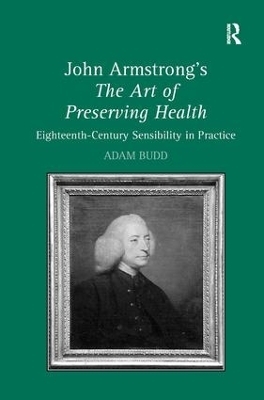
John Armstrong's The Art of Preserving Health
Routledge (Verlag)
978-0-7546-6306-5 (ISBN)
- Titel z.Zt. nicht lieferbar
- Versandkostenfrei innerhalb Deutschlands
- Auch auf Rechnung
- Verfügbarkeit in der Filiale vor Ort prüfen
- Artikel merken
John Armstrong's 2000-line poem The Art of Preserving Health was among the most popular works of eighteenth-century literature and medicine. It was among the first to popularize Scottish medical ideas concerning emotional and anatomical sensibility to British readers, doing so through the then-fashionable georgic style. Within three years of its publication in 1744, it was in its third edition, and by 1795 it commanded fourteen editions printed in London, Edinburgh, Dublin, and Benjamin Franklin's shop in Philadelphia. Maintaining its place amongst more famous works of the Enlightenment, this poem was read well into the nineteenth century, remaining in print in English, French, and Italian. It remained a tribute to sustained interest in eighteenth-century sensibility, long after its medical advice had become obsolete and the nervous complaints it depicted became unfashionable. Adam Budd's critical edition includes a comprehensive biographical and textual introduction, and explanatory notes highlighting the contemporary significance of Armstrong's classical, medical, and social references. Included in his introduction are discussions of Armstrong's innovative medical training in charity hospitals and his close associations with the poet James Thomson and the bookseller Andrew Millar, evidence for the poem's wide appeal, and a compelling argument for the poem's anticipation of sensibility as a dominant literary mode. Budd also offers background on the 'new physiology' taught at Edinburgh, as well as an explanation for why a Scottish-trained physician newly arrived in London was forced to write poetry to supplement his medical income. This edition also includes annotated excerpts from the key literary and medical works of the period, including poetry, medical prose, and georgic theory. Readers will come away convinced of the poem's significance as a uniquely engaging perspective on the place of poetry, medicine, the body, and the book trade in the literary history of eighteenth-century sensibility.
Adam Budd lectures in Comparative Literature and directs the graduate courses in historical methods in the School of History, Classics, and Archaeology at the University of Edinburgh.
Contents: Preface; General introduction: sensibility in practice: Dr John Armstrong's The Art of Preserving Health; Part I The Critical Text: The Art of Preserving Health. Part II Contextual Documents: Poetry: The plague of Athens from the Latin of Lucretius, 1682, Thomas Creech; A nocturnal reverie, 1713, [Anne Finch];A hymn on solitude, 1748, James Thomson; 'Preface', Winter. A poem, 1726, James Thomson; Night the first, 1742, Edward Young; The pleasures of melancholy. A poem,1747, [Thomas Warton]. Theory of the Georgic: An essay on the Georgics, 1697, Joseph Addison; Virgil, The Georgicks, trans. 1741, John Martin; Of didactic or perceptive poetry, 1711, Joseph Trapp. Medical Documents: The plague at Marseilles consider'd, 1720, Richard Bradley; An essay of health and long life, 1724, George Cheyne; A letter to George Cheyne,1724, [Anonymous]; The ill state of physicke in Great Britain, 1727, [John Tristram]; 'Preface', A Full View of All the Diseases Incident to Children, 1742, John Armstrong; Tables; Bibliography; Index.
| Verlagsort | London |
|---|---|
| Sprache | englisch |
| Maße | 156 x 234 mm |
| Gewicht | 760 g |
| Themenwelt | Geisteswissenschaften ► Geschichte ► Regional- / Ländergeschichte |
| Geschichte ► Teilgebiete der Geschichte ► Kulturgeschichte | |
| Geisteswissenschaften ► Sprach- / Literaturwissenschaft ► Anglistik / Amerikanistik | |
| Geisteswissenschaften ► Sprach- / Literaturwissenschaft ► Literaturwissenschaft | |
| Studium ► Querschnittsbereiche ► Geschichte / Ethik der Medizin | |
| Sozialwissenschaften ► Soziologie ► Spezielle Soziologien | |
| ISBN-10 | 0-7546-6306-X / 075466306X |
| ISBN-13 | 978-0-7546-6306-5 / 9780754663065 |
| Zustand | Neuware |
| Haben Sie eine Frage zum Produkt? |
aus dem Bereich


